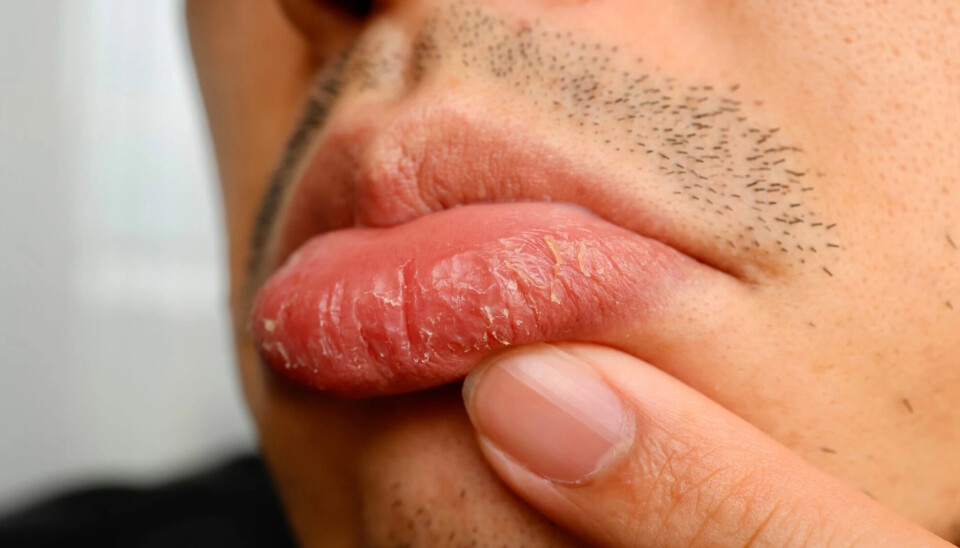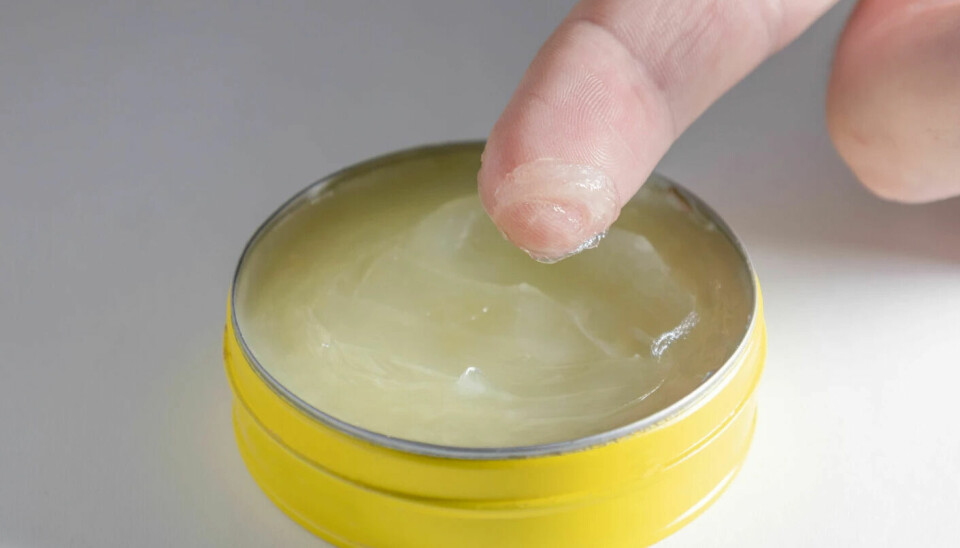
Addicted to lip balm? Maybe you should use something else
ASK A RESEARCHER: If you bite or lick your lips, it quickly becomes a vicious circle of lubrication and drying.
Spring is late this year, and many months of cold weather are hard on the skin.
Do you feel like your lips have suffered this winter? Lip balm can relieve the sandpaper feeling, but it quickly becomes a habit of constant re-applying.
You may have read that lips get used to having something on them – and that you become addicted to lip balm.
“It is not that what you apply makes your lips produce less fat. This is an old myth,” Øystein Grimstad tells sciencenorway.no.
He is an associate professor in skin and venereal diseases at UiT The Arctic University of Norway.
So what happens then, when our lips become dry as bone when we try to stop using lip balm?
A psychological dependency
We create a need when we feel dependent on adding moisture to our lips, Grimstad explains.
“There is some psychology involved here. What you have used leads to the need that you feel,” he says.
We cannot avoid being influenced by commercial interests. The products appeal to us in an ingenious way.
“They make something that has a good consistency and is pleasant to wear with packaging that is user-friendly and easy to store,” Grimstad says.
Comfortable substances can irritate
You may have noticed that some of the popular products on the market have something extra in addition to a pleasant consistency.
Some have a little menthol in them, which gives a fresh and cooling effect because the substance stimulates the cold receptors in the skin, the researcher explains.
Others smell and taste like flowers, berries, and honey.
“It feels good right away, but flavourings and colouring agents can irritate,” Grimstad says.
The substances can have the opposite effect, and you end up in a vicious circle.
“The irritant substances bother the skin surface a little, and you feel like you have to add more all the time,” he says.
Vaseline is best
But what do we do when it's cold outside and our lips crack and we desperately feel the need for an extra protective layer?
What is best, ideally? To stop applying anything to your lips at all?
Grimstad says that it is wise to distinguish lip balms from other products used on the lips. Lip balms have that special, good consistency. But a lip barrier protector can be very different.
“If you use a proper lip barrier protector, there is no reason to object to it,” he says. “You don't become physically dependent on it, only mentally.”
Grimstad says the best thing you can do for your lips is to use petroleum jelly, i.e., Vaseline. Either yellow or white.
"Vaseline does not have the same comfort or pleasantness when applied," he says.
Should protect against moisture and licking
Vaseline can be a little sticky, and the packaging is not fancy. The advantage is that it provides good protection against what the lips are exposed to from food and drink, without irritating the skin.
“It also protects your lips from moisture from the tongue when you lick your lips, drink soft drinks and water, and so on,” Grimstad says.
However, it requires a touch of personal effort: You have to leave your lips alone.
When your tongue, drink, or food touches your lips, the natural, protective layer of fat is worn down.
This definitely applies if you are a lip biter.
“If you grind your teeth against your lips or bite them, you will need additional supplies,” Grimstad says.
Constantly applying lip balm can become part of a bad habit.
“It is difficult to change behavioural patterns,” Grimstad notes.
Common lip balms contain a lot of strange things
Grimstad finds that many people consider common lip balms found in grocery stores as simple and clean products.
“They contain many different ingredients, including essential oils, alcohols, and other substances,” he says.
Some also contain sheep fat or lanolin. Grimstad believes that this is an issue and keeps those lip balms away from his own lips.
“It is a potential allergen. There is a small chance of developing an allergy, but it can happen. It is also an irritating substance,” he says.
Vaseline, which he recommends, contains petrolatum, which is a type of water-repellent wax.
“Petrolatum is safe because nobody develops an allergy to it. It is also not an irritant,” he says.

Winter lips
Perhaps you become very dependent on lip balm during the winter, but does it automatically get better when the warmth of spring returns?
According to the UiT researcher, we do not have a stable production of fat in our skin. It is influenced by many external factors, such as viral infections or cold temperatures. Therefore, your lips may produce less fat when it is cold in the winter months.
“At the same time, wear and tear is greater because the cold temperature makes the lips dry faster. They are then more exposed to irritants,” he explains.
The same goes for when your lips become dry due to a cold. They become less resistant.
“It is no coincidence that you often get cold sores at the same time as a cold,” Grimstad says.
Moisturiser instead?
Could it be an idea to simply choose an oily moisturiser for dry lips to help with fat production?
Grimstad emphasises that most of us do not need to moisturise our lips. We should have barriers against moisture instead of actively adding moisture. Then our lips will keep themselves moist under these barriers.
But again: The condition is that you do not break the barrier with your teeth or nails, because then the skin will still dry out.
“There is not the same need to add moisture to the skin on the lips as on the hands or on eczema-prone skin,” he says.
Furthermore, it is wise to remember that moisturisers do not always work well.
“Many of the oily moisturisers that have traditionally been used on the skin are bad. They form a thick film and do not provide hydrating substances,” Grimstad says.
An old phenomenon
As a phenomenon, dry lips are nothing new.
Apparently, people experimented with natural products such as beeswax and olive oil as early as 2,000 years ago, according to researcher Christian Moro writing about why our lips become dry in an article for The Conversation.
In the 19th century, you could be recommended earwax for dry and sore lips. It might not have quite caught on. Shortly thereafter, the first commercial lip balms came on the market.
Moro also lists some things you might want to avoid, such as artificial colours, menthol, and other flavours and scents, as well as lanolin.
“And be sure to stop biting, picking, or excessively licking your lips,” he advises.
Norwegian Health Information also recommends Vaseline for dry lips (link in Norwegian).
Lips are a veranda for the sun
Finally, there is one more thing to think about as we enter the summer season.
Grimstad suggests finding a lip balm that does not contain irritants but has spf.
“The sun is a very powerful irritant for the lips. They function as a perfect veranda,” Grimstad says.
He explains that the more perpendicular the sun hits, the more damage it can do. During a long summer day, our lips can be exposed to a lot of harmful UV rays.
———
Translated by Alette Bjordal Gjellesvik.
Read the Norwegian version of this article on forskning.no




































